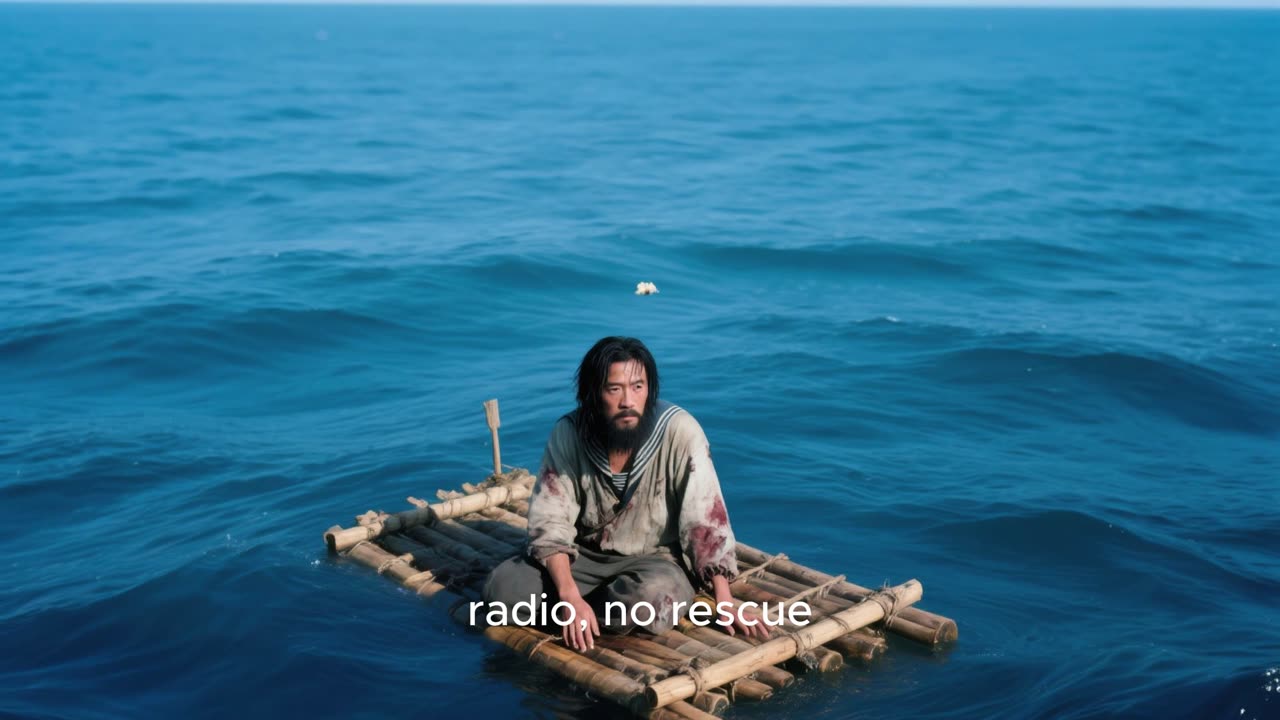Premium Only Content

Lost at Sea
The Unbelievable Survival of Poon Lim
There are places on Earth where the line between life and death is as thin as a breath, and the open ocean is one of them. Beneath its endless blue, the sea hides both beauty and terror — and for one man, it became a prison without walls, a test of human will so extreme it would seem almost impossible to believe. This is the true story of Poon Lim, the man who survived alone in the middle of the Atlantic Ocean for one hundred and thirty-three days.
It began in the middle of World War II, in November 1942. Poon Lim was a Chinese sailor serving on a British merchant ship called the SS Benlomond, which was crossing from Cape Town to Suriname, carrying supplies through dangerous waters patrolled by German submarines. The war had already claimed thousands of ships, but no one expected what was coming.
On a quiet afternoon, when the sea seemed calm, a torpedo struck. The explosion ripped through the hull, splitting the ship apart. Within minutes, it began to sink. Fire tore through the decks, metal screamed, and sailors leapt into the water as oil burned on the surface. Poon Lim managed to grab a life jacket and hurl himself into the ocean just as the Benlomond disappeared beneath the waves.
He found himself alone. The sea stretched to the horizon in every direction. Bodies floated nearby, then slowly sank into the dark. The only sound was the wind and the distant hiss of the burning wreck. Hours later, by sheer chance, he spotted a small wooden raft drifting in the waves. Using the last of his strength, he swam toward it, climbed aboard, and collapsed.
When he woke, he realized the true horror of his situation. He was stranded in the middle of the Atlantic Ocean, hundreds of miles from land, with no radio, no rescue, and no one who even knew he was alive.
The raft was simple — just a few planks of wood, some empty water tins, and a small canvas sail. Inside a storage box, he found a few emergency rations: a tin of biscuits, some sugar, a bit of chocolate, and two gallons of water. Enough for a week, maybe two. He rationed carefully, eating only a few crumbs at a time, but hunger came like a storm.
Days turned into weeks. The sun blistered his skin by day, the cold froze him by night, and the saltwater cracked his lips until they bled. He collected rainwater in his clothes and drank it drop by drop. When his food ran out, he learned to fish using a hook he made from a nail and a thread pulled from his shirt. He caught small fish, ate them raw, and sometimes drank their blood to stay hydrated.
One night, a shark began circling his raft. Its black fin sliced the water like a blade. It came closer and closer, bumping the wooden boards. Poon Lim waited, terrified but determined, and when the shark lunged, he struck it with his knife again and again until it stopped moving. He cut pieces of its flesh to dry in the sun — his only food for weeks.
He marked the passing days by tying knots in a rope, but soon the count became meaningless. Time dissolved into survival. He sang to himself to stay sane, whispered prayers to the stars, and dreamed of his family far away in China. Sometimes ships passed on the horizon, but none saw him. Once, a German U-boat surfaced near him, and sailors even waved — but they did not stop. Another time, an American plane flew overhead, but when he tried to signal, it disappeared into the clouds.
His body grew thinner, his beard long, his eyes hollow. Yet inside, something refused to break. He built traps for seagulls, catching them with bait and drinking their blood to stay alive. He learned the rhythm of the sea, how to face storms by tying himself to the raft, how to use the stars to keep his spirit anchored to hope.
After one hundred and thirty-three days adrift — nearly five months — he saw a shadow on the horizon. It was a small fishing boat from Brazil. The fishermen pulled him aboard, weak and trembling, more ghost than man. He weighed barely a hundred pounds. When they took him ashore, he could hardly stand, but he smiled, whispering that he had made it.
Poon Lim had drifted more than one thousand miles across the ocean, surviving longer than any castaway in recorded history. When the British Navy heard of his survival, they were astonished. They interviewed him for hours, studying how he had managed to endure the impossible. His story inspired new safety designs for life rafts and emergency rations — and even decades later, sailors spoke his name with awe.
When asked how he survived, he said simply, “I didn’t want to die. I wanted to see land again.” It was not luck that saved him, but an unbreakable will — the quiet power of a man who refused to surrender to the sea.
Poon Lim lived to an old age, carrying with him the memory of endless water, the burning sun, and the nights when the stars were his only companions. His survival remains one of the most extraordinary tales of endurance ever told, a reminder that the human spirit, even alone in the vastness of the ocean, can outlast the impossible.
-
 LIVE
LIVE
Lofi Girl
3 years agolofi hip hop radio 📚 - beats to relax/study to
128 watching -

FreshandFit
12 hours agoLas Vegas Takeover!
181K14 -
 2:19:29
2:19:29
Badlands Media
12 hours agoDevolution Power Hour Ep. 404
66.8K36 -
 6:02:58
6:02:58
Drew Hernandez
1 day agoGOP COOKED INTO DENIAL & 12 ISRAELI-LINKED PHONES DETECTED AT UVU DAY OF CK EXECUTION?
46.1K24 -
 2:46:08
2:46:08
TimcastIRL
8 hours agoFAA To STOP Flights Over Shutdown, May CLOSE Airspace, Thanksgiving Travel APOCALYPSE | Timcast IRL
193K112 -
 1:56:20
1:56:20
Tucker Carlson
8 hours agoIt’s Time to Decide: America First or Lindsey Graham’s Psychosexual Death Cult?
108K402 -
 9:07:39
9:07:39
SpartakusLIVE
10 hours agoBattlefield 6 - REDSEC || ARC Raiders Later? || Anybody Want Warzone???
74.9K5 -
 3:56:11
3:56:11
Alex Zedra
7 hours agoLIVE! Spooky Games tn
52.3K4 -
 2:58:21
2:58:21
I_Came_With_Fire_Podcast
17 hours agoThe Normalization of Political Violence | Right Wing In-Fighting | China Chooses China
37.2K11 -
 2:37:06
2:37:06
PandaSub2000
12 hours agoLIVE 10:30pm ET | BUZZ TRIVIA with Chat!
39.2K5